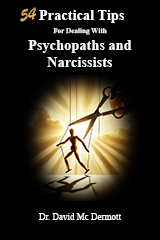- Home
- What is Narcissistic Personality Disorder?
- What is narcissistic behavior?
- Narcissistic injury
Narcissistic Injury Explained
Narcissistic injury is the term used for any threat to a narcissist's outsized ego or self-esteem.
Remember that those with narcissistic personality disorder have a distorted sense of their own self importance and consider themselves superior to others as well as entitled to whatever they want.
They live in a fantasy world where they consider they have great success and/or power, intelligence and beauty. They believe they are unique and deserving of special attention. They require praise, admiration and attention to boost this ego and inflated image of themselves.
Perceptions
Anything that they perceive as a threat to this 'false-self' or to their sense of dominance, is considered narcissistic injury. The word 'perceived' is important because it means that the threat may not be real, for example, it may not be perceived as a challenge by normal people.
A 'real' threat may be something such as a person pointing out one of their lies, or challenging their dominance, or saying that the narcissists needs should come second to their own.
Things that a narcissist might consider injurious include such things as when someone makes a simple remark about the color of the narcissist's clothes not being the best for them, or that something of the narcissist could be better, or when someone disagrees with their opinion.
Ordinarily, these things are part and parcel of everyday conversations and people decide if they want to pay attention to them and take it as advice, or not!
Sometimes it's the not saying something that causes the injury. When the narcissist does something, they often expect compliments and praise, no matter how small the thing. Normal people may consider that no comment is necessary, and so they say nothing.
For the narcissist, however, not receiving the praise or compliment may be perceived as an insult, a criticism of what they have done, and they respond to it as such.
How dare you!
Narcissists often respond to narcissistic injury as if it's a serious criticism, a total rejection, a definite threat to their very existence.
The response is often swift, intense and very often out of proportion. It is called narcissistic rage and can vary from totally ignoring the source to verbal and physical violence. You can read more about narcissistic rage here...
The response is often to belittle the source, rather than dealing with the content of the criticism or disagreement. The resulting attack can be brutal.
The response may not be swift. These types are very competitive and want to be best, first and so on. They also have to win. They are also very good at keeping score. This generally means that they do not forget about moments when they were slighted. Not only that, but they are on the lookout for opportunities to get back at people who have 'injured' them. They can hold a grudge for years!
There are a couple of things to keep in mind here. One is that the narcissist can inflict damage on someone without necessarily saying why they are doing it or referencing the previous narcissistic injury. For the victim it often seems that the abuse came out of nowhere, that the narcissist just 'lost it' for no reason at all. The second thing is that the narcissist can decide to get payback multiple times for the same narcissistic injury. It may not be just one-upmanship for the narcissist but they may not be content until they have paid back their victim multiple times for the one injury.
If you inflict an injury on a malignant narcissist, be prepared for consequences!
Why?
There are various ideas about why narcissists respond to perceived threats in this way.
- It's a way for them to change from feeling victimized to causing pain to others.
- They consider that they have lost control of their world and respond to re-establish themselves as the dominant force.
- They believe that the narcissistic supply is generated from inside, it is a reflection from the outside of their inner brilliance. The narcissistic injury, however, comes from the outside and therefore has to be treated more 'seriously'.
- Narcissistic injury causes shame, depression, anxiety and they attack the source in order to stabilize themselves again.
The fact that there are so many explanations suggests that no one of them is true in all cases, and it may be that they are all true to varying degrees.
Worried about causing narcissistic injury?
If you are tiptoeing around a verbally abusive man or woman that you suspect may be a narcissist and you want to avoid causing narcissistic injury, it's time to re-evaluate the relationship and whether it's in your best interests to continue with it or not.
If you are in a relationship with a narcissist, expect to lose. It really is that simple. The amount and duration will vary, but you should be prepared to pay.
The least you should be doing is learning about narcissism, mind control and how specifically they control and dominate those around them.
Only then are you in a position to make an informed decision about what's best for you...
Like this page?
Don't wait.
Get help now.
If you're trapped in an abusive relationship, struggling with the impact of a cult, or worried about someone you love, you need answers and support today.
Reach out to me via the Contact page.
We'll talk, create a plan and take the first steps to freedom. Compassionate, judgement-free guidance and personalized strategies. Your privacy is 100% protected.
Available now!

54 Practical Tips For Dealing With Psychopaths and Narcissists
You have the theory but how do you actually apply it? This book spells it out...
Dealing With Psychopaths
Free monthly newsletter with practical tips and ideas to help you understand and navigate the chaos that they cause!